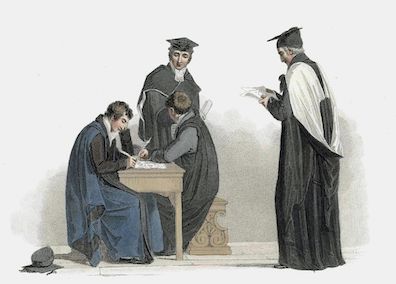One glimpse of John Eglinton's reverence for
George
Russell comes when Scylla and Charybdis uses a
detail from Eglinton's college education to characterize the
relationship: "Glittereyed, his rufous skull close to his
greencapped desklamp sought the face bearded amid darkgreener
shadow, an ollav, holyeyed. He laughed low: a sizar's laugh of
Trinity: unanswered." Sizars were undergraduates at Cambridge
University, in England, and Trinity College, in Dublin, who
received financial assistance from the institution in exchange
for menial work duties. The detail implies a history of
subservience on Eglinton's part.
Students who paid the fees at Cambridge and TCD were called
pensioners. Some promising students whose parents could not
afford the cost were admitted as sizars (occasionally spelled
"sizers") in an arrangement whereby free education, room, and
board were compensated with regular duties that essentially
made them servants to the wealthier students. These
impecunious students, of course, might be just as gifted and
accomplished as their social betters. In many cases they must
have been more so, since they were admitted solely on the
basis of merit rather than family connections, and they knew
that a university education could lift them out of the states
of relative poverty in which they had been raised. Richard
Westfall, a historian of science who wrote a biography of
Isaac Newton––a sizar at Cambridge––shows in Never At Rest
(1980) that from an early time sizars at Cambridge attained
degrees at a much higher rate than did gentlemen (75).
William Kirkpatrick Magee (John Eglinton) was awarded
numerous prizes at TCD. From 1887 to 1893 he won the
Vice-Chancellor's prize for composition in English, Greek, and
Latin four times. He won a similar prize for verse twice, and
a prize for prose twice. But the fact of having been a sizar,
which Joyce keenly noted and memorialized, must have marked
him for life as a social inferior, and the way Joyce mentions
it indicates that it has left permanent scars in his psyche.
His "sizar's laugh of Trinity" in the direction of the
man he reveres suggests an attitude of deference and
ingratiation that he learned at school. It is surely
significant that the laugh goes "unanswered" by
Russell, much as the haughty children of the wealthy at
Trinity would have accepted ingratiating laughs from their
sizars without condescending to echo them. In a personal
communication, Vincent Van Wyk observes that Eglinton's
acerbic manner elsewhere in Scylla has perhaps been
spawned by this disparity in privilege––an adult compensation
for the humiliations of late adolescence.
In a short article "On the History of Sizarship in Trinity
College," Hermathena 13 (1905): 315-18, the famous
Trinity don John
Pentland Mahaffy writes that "Subsizars attended on the
Scholars' table, while the Sizars attended on that of the
Fellows. It was a tradition up to my youth that they dined off
the remains left after the Fellows' dinner, and that they rang
the bell, swept the hall, and performed other menial offices.
This I used to hear from my father, who was a Scholar in 1821;
but I cannot remember whether he described it as existing in
his day, or already obsolete" (315-16). This testimony
suggests that as the 19th century wore on sizars were
subjected to less humiliating treatment than before. But the
indignities before were searing. Here is English historian
William Howitt writing in 1847 about Oliver
Goldsmith:
The family income did not allow him to occupy a
higher rank than that of a sizer, or poor scholar, and this
was mortifying to his sensitive mind. The sizer wears a black
gown of coarse stuff without sleeves, a plain black cloth cap
without a tassel, and dines at the fellows' table after they
have retired. It was at that period far worse; they wore
red caps to distinguish them, and were compelled to
perform derogatory offices; to sweep the courts in the
morning, carry up the dishes from the kitchen to the fellows'
table, and wait in the hall till they had dined. No wonder
that a mind like that of Goldsmith's writhed under the
degradation! He has recorded his own feelings and opinions on
this custom: "Sure pride itself has dictated to the fellows of
our colleges the absurd fashion of being attended at meals,
and on other public occasions, by those poor men who, willing
to be scholars, come in upon some charitable foundation. It
implies a contradiction, for men to be at once learning the
liberal arts and at the same time treated as slaves; at once
studying freedom and practising servitude."
How long did sizars continue to be stigmatized with red caps,
like Jews with yellow stars and homosexuals with pink
triangles in Hitler's Germany? Into Eglinton's time? Gone by
then, but within recent memory? I do not know the answers to
those questions, but the mention of Eglinton's "rufous
skull" suggests an allusion to the practice. Rufous
means reddish brown. According to George Moore's Hail and
Farewell, Eglinton was "a thin small man with dark red
hair growing stiffly over a small skull" (162). In Joyce's
prose his red hair grips his head like a cap, as if his skull
has been permanently marked by his experience of "practising
servitude."
Some servitude is rewarded, however. Eglinton's laughing
efforts to curry Russell's favor make some headway after he
offers up to the oracle a demeaning joke about Aristotle: "He
laughed again at the now smiling bearded face."


